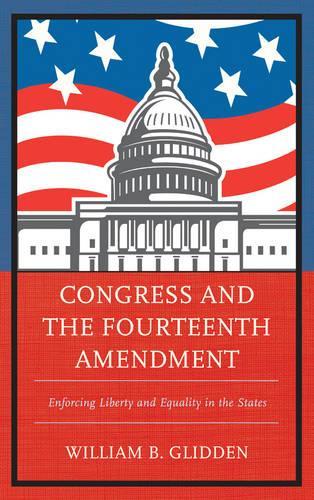
Congress and the Fourteenth Amendment: Enforcing Liberty and Equality in the States
(Paperback)
Publishing Details
Congress and the Fourteenth Amendment: Enforcing Liberty and Equality in the States
By (Author) William B. Glidden
Bloomsbury Publishing PLC
Lexington Books
24th March 2015
United States
Classifications
Professional and Scholarly
Non Fiction
Legal history
Constitution: government and the state
Central / national / federal government
342.73085
Physical Properties
Paperback
188
Width 151mm, Height 227mm, Spine 15mm
290g
Description
The discrepancy between the fourteenth amendments true meaning as originally understood, and the Supreme Courts interpretation of its meaning over time, has been dramatic and unfortunate. The amendment was intended to be a constitutional rule for the promotion and protection of peoples rights, administered by the states as front-line regulators of life, liberty, and property, to be overseen by Congress and supported by federal legislation as necessary. In this book, William B. Glidden makes the case that instead, the amendment has operated as a judge-dominated, negative rights-against-government regime, supervised by the Supreme Court. Whenever Congress has enacted legislation to protect life, liberty, or property rights of people in the states, the laws were often overturned, narrowly construed, or forced to rely on the power of Congress to regulate interstate commerce, under the Supreme Courts constraining interpretations. Glidden proposes that Congress must recover for itself or be restored to its proper role as the designated federal enforcement agency for the fourteenth amendment.
Reviews
Glidden presents a novel interpretation of the intent of the Fourteenth Amendment. Deftly packing in nearly 150 years of legislative and judicial history, Glidden argues that the Supreme Court eviscerated the true purpose of the amendment by limiting its scope to state action. He concludes with a proposal of how Congress could be restored to its rightful position to more meaningfully enforce the amendment. . . .[F]or its willingness to connect current congressional limitations to a fresh analysis of the historical record, Glidden's book makes a contribution worthy of consideration. Summing Up: Recommended. Upper-division undergraduate, graduate, and research collections. * CHOICE *
Relying on a crisp and comprehensive inquiry into the Fourteenth Amendment's natural-rights background, William Glidden offers a cogent argument for restoring Section Five, the enforcement section, to its rightful place as a major vehicle for ensuring that everyone enjoy the full range of liberties the Amendment's framers intended us to have. -- Mark Tushnet, William Nelson Cromwell Professor of Law, Harvard Law School
In Congress and the Fourteenth Amendment: Enforcing Liberty and Equality in the States, William Glidden provides a compelling and timely history of the Fourteenth Amendment, focusing particularly on Section Ones Privileges and Immunities Clause, Section Fives Enforcement Powers, and the Civil Rights Acts of the 1870s passed in their wake. He shows, first, that the Amendments framers intended to address not only state sponsored discrimination, but also the subordination of newly freed slaves through violent and oppressive acts of private parties as well: the Amendment requires states to provide equal protection of the law against such private oppression, and it empowers Congress, in Section Five, to take remedial actions if states fail to do so. Glidden then shows how the Supreme Court eviscerated the original intent of the amendment, particularly through the specious "state action" requirement, thus limiting the Amendments reach to official acts of discrimination, and how that stunted the power of all of the reconstruction era amendments, from the time of their passage to the present. Finally, he shows us a way we might recapture their original meaning, and thereby move us further toward a more racially just society. This book is a convincing counter to the confused and limited history of the Reconstruction Amendments that successive Supreme Courts have constructed, in defense of a far narrower and less just interpretation of our constitutional history. -- Robin West, Frederick Haas Professor of law and philosophy, Georgetown University Law Center
Author Bio
William B. Glidden earned a PhD in American History at the University of Illinois and a law degree at New York University Law School. He spent three years as an assistant professor of history at Clarkson College of Technology and the rest of his career as an attorney in the Law Department of the Comptroller of the Currency, a bureau in the U.S. Treasury Department.
